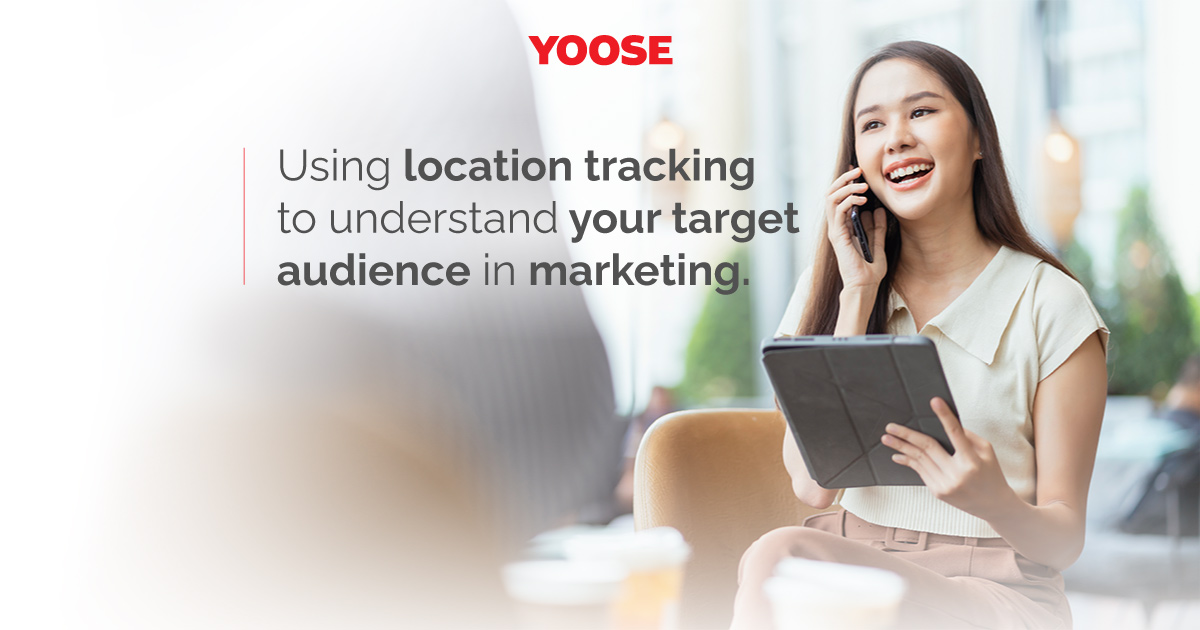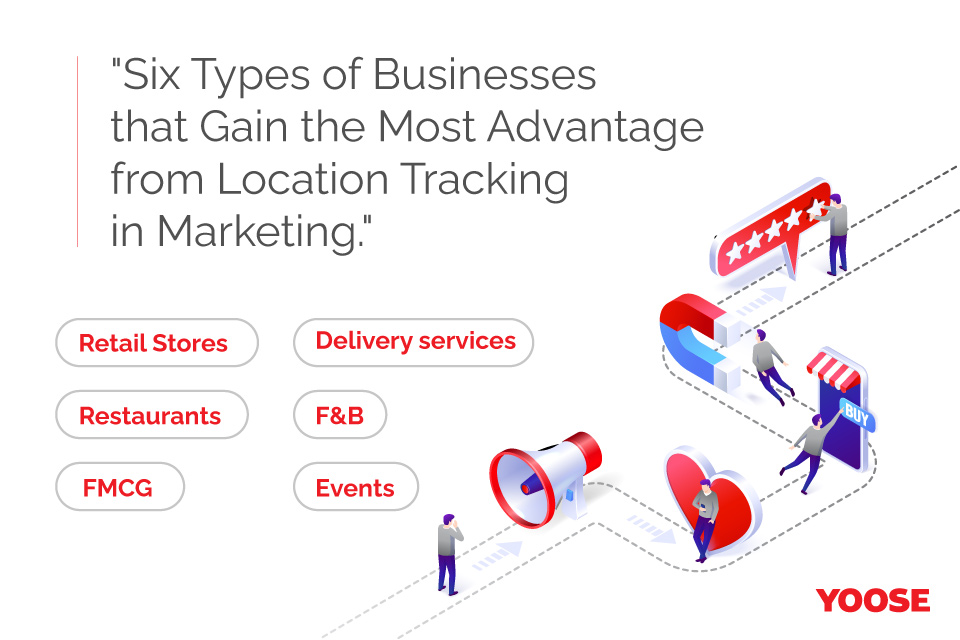Location Tracking: The Key to Unlocking Your Audience's Needs in Marketing
Location tracking has become an increasingly popular tool in the world of marketing. By using location data, businesses can gain valuable insights into their customers' behavior and preferences, and target their marketing efforts more effectively. In this blog post, we will explore the benefits of using location tracking for audience targeting in marketing, as well as common strategies and best practices for using location data ethically and effectively.

In this blog, we’re going to look at:
- What Is Location Tracking?
- How Does Location Tracking Work?
- How Does Location Tracking Affect Marketing?
- Which Businesses Benefit Most from Location Tracking in Marketing?
- Location Tracking and Local SEO: How They're Connected.
- Best Practices for Using Location Data Ethically and Effectively
- Conclusion
What is Location Tracking?
Location tracking is the process of collecting and analyzing data on a user's physical location. It's usually done through the use of GPS or Wi-Fi signals on a mobile device. This technology has become increasingly popular as businesses seek to gain insights into user behavior and preferences, and to deliver personalized marketing messages based on their location. Whether it's a map application like Google Maps or a navigation app like Waze, most people have likely used location tracking technology in some form or another. As this technology continues to evolve, businesses are finding new ways to use location data to better understand their customers and improve their overall marketing strategies.
![]()
How Does Location Tracking Work?
In today's digital age, location tracking has become an essential part of our lives. From navigation apps to social media platforms, almost every app on our smartphones collects location data. But how does location tracking work? Let's take a closer look.
Location tracking involves collecting data about an individual's physical location. This data can be collected through a variety of means, including GPS tracking, mobile devices, and IP addresses.
GPS
GPS (Global Positioning System) is one of the most popular methods for location tracking. It's a satellite-based navigation system made up of interconnected satellite networks. Each satellite sends signals down to Earth, where GPS receivers can connect to these signals and compare send-and-receive times. Through this comparison, the app knows the distance between a satellite and the device it's stored on. Using this data, the app calculates the location of the device.
This system can track, record, and share the location data of devices all over the world in real-time, not just for smartphones and tablets, but also for vehicles, pet trackers, and anything else containing a GPS receiver. GPS tracking is very accurate and can pinpoint the location of a device within a few meters.
Wi-Fi signals
Another method for location tracking is Wi-Fi signals. When you connect your device to a Wi-Fi network, the network can determine your location based on the strength of the signal. This is why some apps ask for permission to access your Wi-Fi network. By analyzing the strength of the Wi-Fi signal, the app can determine your location.
Beacons and RFID tags
Beacons and RFID tags are also used for location tracking. Beacons are small devices that transmit a signal that can be picked up by other devices, such as smartphones or tablets. By placing beacons in a specific location, businesses can track when someone enters or leaves a specific area. RFID tags work similarly to beacons, but they use radio waves to transmit data.
Location tracking is not just limited to smartphones and tablets; it's also used in other devices, such as smartwatches, fitness trackers, and even cars. These devices can track your location, monitor your activity, and provide you with personalized recommendations based on your location data.
How Does Location Tracking Affect Marketing??
Location tracking has a significant impact on marketing, as it allows businesses to deliver targeted advertisements and promotions to customers based on their physical location.
Enables Targeted Advertising
Location tracking allows businesses to deliver targeted advertisements and promotions to customers based on their physical location. This helps businesses reach their target audience more effectively and improve the relevance and effectiveness of their marketing messages. For instance, a coffee shop chain can send a promotional message to customers located near one of their stores, offering them a discount on their favorite beverage.
Personalized Marketing Efforts
By using location data, businesses can create more personalized and relevant marketing messages. This helps businesses engage with their customers more effectively and build stronger relationships with them over time. For example, a fitness app can suggest nearby running trails to users based on their location, encouraging them to continue using the app and potentially becoming a loyal customer.
Improves Customer Engagement
Location-based marketing can help businesses improve their customer engagement and loyalty by providing relevant and timely offers. This encourages customers to engage with companies more frequently and builds stronger relationships between customers and companies. A retail store can send push notifications to customers in the store, notifying them of special deals on certain products or upcoming events.
Provides Valuable Insights
Location tracking gives businesses valuable insights into their customers' behavior and preferences. By analyzing location data, businesses can identify patterns and trends that inform their marketing strategies and improve their audience targeting. This helps businesses make data-driven decisions and optimize their marketing campaigns for maximum impact. For example, a restaurant chain can use location data to determine the popularity of certain menu items in different regions and adjust their marketing efforts accordingly.
Which Businesses Benefit Most from Location Tracking in Marketing?
Location tracking is particularly useful for businesses that have a physical presence, such as retail stores, restaurants, FMCG, events, F&B, hotels and delivery services.
Retail Stores
Location tracking can help retailers understand their customers' shopping behavior and preferences. By collecting data on which stores customers visit, how long they spend in each store, and which products they view or purchase, retailers can optimize their store layouts, product placements, and marketing strategies. For example, a retailer could use location tracking data to identify which products are most popular in certain regions or stores and adjust their inventory accordingly.
Restaurants
Location tracking can help restaurants understand their customers' dining habits and preferences. By collecting data on which restaurants customers visit, how often they visit, and what types of cuisine they prefer, restaurants can optimize their menus, marketing strategies, and customer service. For example, a restaurant could use location tracking data to identify which dishes are most popular among customers in certain regions and adjust their menu accordingly.
FMCG
Location tracking can help FMCG brands understand their customers' shopping behavior and preferences. By collecting data on which stores customers visit, how often they purchase certain products, and which products they view or purchase together, FMCG brands can optimize their product placements, marketing strategies, and supply chain management. For example, an FMCG brand could use location tracking data to identify which stores have the highest demand for certain products and adjust their supply accordingly.
Events
Location tracking can help event organizers understand their attendees' behavior and preferences. By collecting data on which areas of the event attendees visit, how long they spend in each area, and which activities they participate in, event organizers can optimize their event layouts, marketing strategies, and attendee experiences. For example, an event organizer could use location tracking data to identify which activities are most popular among attendees and adjust their event schedule accordingly.
F&B
Location tracking can help F&B businesses understand their customers' dining habits and preferences. By collecting data on which restaurants customers visit, how often they visit, and what types of cuisine they prefer, F&B businesses can optimize their menus, marketing strategies, and customer service. For example, a restaurant could use location tracking data to identify which dishes are most popular among customers in certain regions and adjust their menu accordingly.
Delivery services
Location tracking is also extremely useful for businesses in the delivery services industry, such as food delivery and courier services. By using GPS-enabled devices to track the location of their delivery drivers and vehicles, businesses can optimize their delivery routes, improve their delivery times, and provide more accurate delivery estimates to their customers.
Location Tracking and Local SEO: How They're Connected
Local SEO is the process of optimizing a business's online presence to improve its visibility and reach in local search results. It is important for businesses with brick-and-mortar locations or those that serve customers in specific geographic areas. By following local SEO best practices, businesses can improve their organic traffic from searches performed by nearby customers. Did you know that 46% of all Google searches are seeking local information? That's right - nearly half of all searches are looking for businesses and services in their immediate vicinity.
Several criteria affect local SEO, including the relevance, distance, and prominence of a business's location. Relevance refers to how well a business's website and online listings match the search query. Distance refers to how far a business is from the searcher's location. Prominence refers to the overall popularity and reputation of the business.
Location tracking is closely connected to local SEO, as it allows businesses to improve their local search rankings by increasing their visibility in their target geographic areas. When businesses use location tracking to run marketing campaigns, they can optimize their ads to appear in relevant searches for their target locations.
When someone clicks on the ad, the link will lead them directly to the business location on Google Maps, increasing the likelihood of engagement and potentially converting that click into a customer visit. This, in turn, leads to more searches for the business in that particular location, boosting their search rankings in the local search results.
Furthermore, location tracking can also help businesses improve their local SEO by providing accurate and up-to-date location information for their business listings. This can include the correct address, phone number, and hours of operation, which are all important factors that can impact local search rankings.
Best Practices for Using Location Data Ethically and Effectively
While location-based marketing can offer significant benefits for businesses, it is important to use location data ethically and transparently. Here are some best practices for using location data effectively:
Be Transparent
Businesses should be transparent about the data they collect and how it is used. Customers should have the option to opt-in or opt-out of location tracking, and should be informed about how their data is being used.
Respect Privacy
Businesses should respect their customers' privacy and only collect the data they need to provide a specific service or offer. They should also ensure that customer data is secure and protected from unauthorized access.
Use Data Responsibly
Businesses should use location data responsibly and avoid using it to target vulnerable or sensitive groups of customers. They should also ensure that the data is accurate and up-to-date, and avoid making assumptions based on incomplete or outdated information.
Analyze Data
Finally, businesses should analyze location data to gain actionable insights about their customers' behavior and preferences. By analyzing the data, businesses can identify patterns and trends that can inform their marketing strategies and improve their audience targeting.
Conclusion
Location tracking is a powerful tool for businesses looking to improve their audience targeting and optimize their marketing campaigns. YOOSE offers a solution to overcome the challenges of scalability and precise localization. YOOSE - the leading experts in location-based marketing solutions these providers in managing, mapping, visualizing, and interacting with billions of data points in real time on interactive geo charts. If you want to learn more about how location-based marketing can help you connect with customers at every stage of the customer lifecycle, contact YOOSE today for a discussion.



